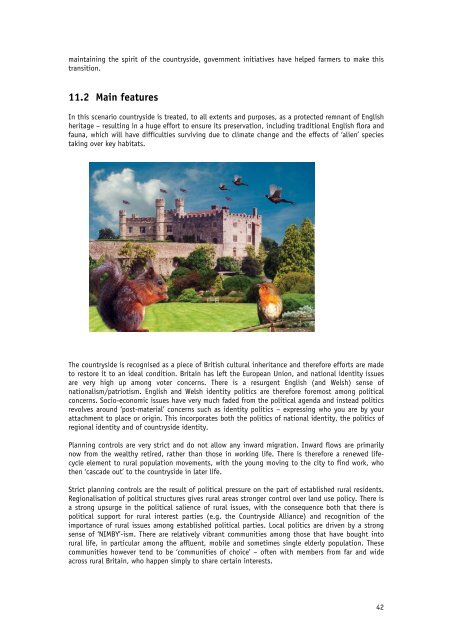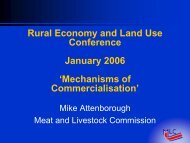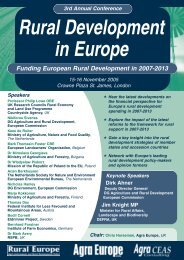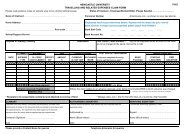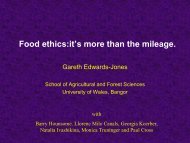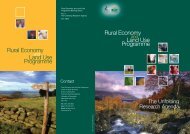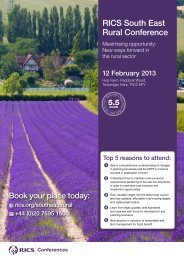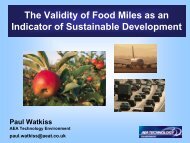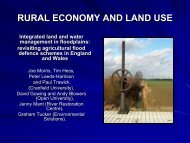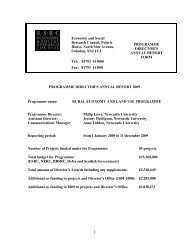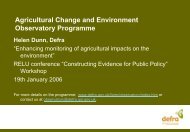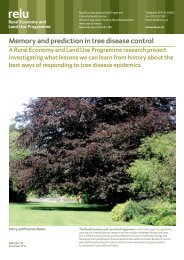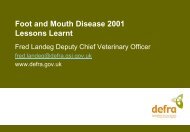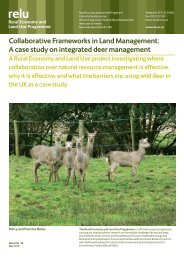Future Society in 2024: 21st Century 'Good Life' - Rural Economy ...
Future Society in 2024: 21st Century 'Good Life' - Rural Economy ...
Future Society in 2024: 21st Century 'Good Life' - Rural Economy ...
Create successful ePaper yourself
Turn your PDF publications into a flip-book with our unique Google optimized e-Paper software.
ma<strong>in</strong>ta<strong>in</strong><strong>in</strong>g the spirit of the countryside, government <strong>in</strong>itiatives have helped farmers to make this<br />
transition.<br />
11.2 Ma<strong>in</strong> features<br />
In this scenario countryside is treated, to all extents and purposes, as a protected remnant of English<br />
heritage – result<strong>in</strong>g <strong>in</strong> a huge effort to ensure its preservation, <strong>in</strong>clud<strong>in</strong>g traditional English flora and<br />
fauna, which will have difficulties surviv<strong>in</strong>g due to climate change and the effects of ‘alien’ species<br />
tak<strong>in</strong>g over key habitats.<br />
The countryside is recognised as a piece of British cultural <strong>in</strong>heritance and therefore efforts are made<br />
to restore it to an ideal condition. Brita<strong>in</strong> has left the European Union, and national identity issues<br />
are very high up among voter concerns. There is a resurgent English (and Welsh) sense of<br />
nationalism/patriotism. English and Welsh identity politics are therefore foremost among political<br />
concerns. Socio-economic issues have very much faded from the political agenda and <strong>in</strong>stead politics<br />
revolves around ‘post-material’ concerns such as identity politics – express<strong>in</strong>g who you are by your<br />
attachment to place or orig<strong>in</strong>. This <strong>in</strong>corporates both the politics of national identity, the politics of<br />
regional identity and of countryside identity.<br />
Plann<strong>in</strong>g controls are very strict and do not allow any <strong>in</strong>ward migration. Inward flows are primarily<br />
now from the wealthy retired, rather than those <strong>in</strong> work<strong>in</strong>g life. There is therefore a renewed lifecycle<br />
element to rural population movements, with the young mov<strong>in</strong>g to the city to f<strong>in</strong>d work, who<br />
then ‘cascade out’ to the countryside <strong>in</strong> later life.<br />
Strict plann<strong>in</strong>g controls are the result of political pressure on the part of established rural residents.<br />
Regionalisation of political structures gives rural areas stronger control over land use policy. There is<br />
a strong upsurge <strong>in</strong> the political salience of rural issues, with the consequence both that there is<br />
political support for rural <strong>in</strong>terest parties (e.g. the Countryside Alliance) and recognition of the<br />
importance of rural issues among established political parties. Local politics are driven by a strong<br />
sense of ‘NIMBY’-ism. There are relatively vibrant communities among those that have bought <strong>in</strong>to<br />
rural life, <strong>in</strong> particular among the affluent, mobile and sometimes s<strong>in</strong>gle elderly population. These<br />
communities however tend to be ‘communities of choice’ – often with members from far and wide<br />
across rural Brita<strong>in</strong>, who happen simply to share certa<strong>in</strong> <strong>in</strong>terests.<br />
42


